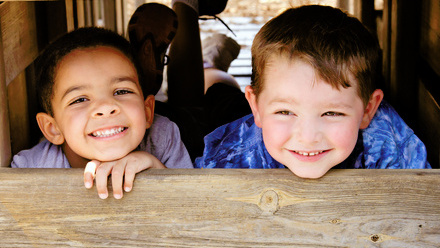Why infant mental health matters
Mental health issues have been at the centre of attention in the past decade. But the focus is usually on adults and older children. Despite emerging as key topic in the later years of the 20th century, infant mental health is still somewhat overlooked. And yet, it plays a critical part in a child’s overall wellbeing from birth, planting roots in their future emotional, social and cognitive development.
In this article, we'll explore what infant mental health is, why it’s important and how we, as professionals, can foster a healthy emotional environment for young children in our care.
What is infant mental health?
Infant mental health refers to the emotional and psychological well-being of babies from birth to age three. It involves how infants develop relationships with their caregivers, how they experience, manage and express emotions, and how they explore the world around them. Healthy infant mental health lays the groundwork for a child’s ability to form secure relationships, regulate emotions and develop a positive sense of self.
Despite its significance to a child’s entire development, there are only 38 parent-infant teams in England when, according to the Parent Infant Foundation, 400 are required for effective provision. The role of the parent/carer in developing secure attachments, safety and belonging is the prominent factor contributing to an infant’s state of mental health. Nonetheless, there remains a ‘baby blindspot’ in current practices and mental health provisions accessible today.
We know that the early years of a child’s life are a period of rapid growth and development from a biological, emotional, social and personal perspective. It is a time rich in learning, mopping up every last dreg of observation and insight as infants thirstily drink in the world around them. Positive early experiences, such as responsive caregiving and nurturing interactions, help build a strong foundation for emotional and cognitive development. These experiences are largely dependent on a strong parent-infant relationship, building bonds from the first moments to secure trusting and meaningful foundations on which to grow healthy confidence, emotional regulation and resilience. These early interactions are the basis for which children will go on to develop other relationships and feel confident and happy in the absence of stressful situations and uncertainty.
We know that, for children born during and immediately after the COVID-19 pandemic, stress levels were heightened and significant changes to daily life had a toll on many people’s mental health. These impacts can be long-lasting on the parent-infant relationship so, whilst we may no longer be in lockdown, it’s important to acknowledge the ongoing impact of those uncertain times in the present today.
It is important to note that the majority of research suggests that promoting IMH can be best achieved by promoting positive relationships between infants and young children and their caregivers
Supporting infant mental health as early education and care professionals
Open conversations with families
As with other aspects of a child’s development, such as early learning in the home environment, supporting infant mental health comes from having established genuine relationships with parents and carers at home. This allows both professional and caregivers at home to communicate any concerns they might have in a safe environment with the child’s best interests at the heart of every conversation.
But infant mental health doesn’t stop with the child themselves – ensuring the home environment is free from risks that could negatively impact mental health involves supporting the mental health of the caregivers too, without being intrusive or disrespectful of boundaries. Being able to recognise symptoms and signpost valuable services is also significant to supporting the infant’s mental health too.
Establishing strong partnerships across the sector
Parent-infant relationships are so important to a child’s overall mental health because mental health problems affect up to 20% of women during the perinatal period (the time between conception and a child’s first year of life). Symptoms of stress, even when still in the womb, impact a baby’s sense of security and contentment which can further impact bonding with caregivers, their sense of risk and have further impact on a child’s mental health and stress responses in later life.
Early education and care professionals have a privileged opportunity to establish relationships with families and get to understand their unique needs, whilst being able to access services that can offer specialised support for additional needs. It is our responsibility, as a frequent point of contact, to ensure accurate information-sharing with external agencies. By doing so, we can support children and their families to ensure close and engaged contact with other service providers that are best placed to provide the support needed.
Ensuring meaningful relationships with children
Just as infant mental health is built with the parent-infant relationship at the centre of its establishment, early education and care professionals can spend up to 50 hours a week with a child in full-time provision – that’s a lot of time! With every infant in our care, fostering reliable attachments with keyworkers provides a stability and consistency to their out-of-home care and helps to create a strong sense of belonging and security outside of the home.
Conclusion and further reading
Infant mental health is a key consideration when working with young children to ensure their mental health is as supported as their social, emotional, physical and cognitive wellbeing.
Find out more about the important role early education and care professionals play in supporting infant mental here.






